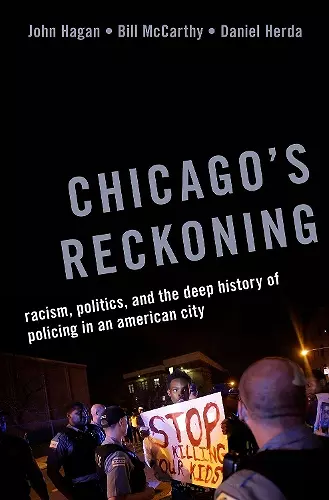Chicago's Reckoning
Racism, Politics, and the Deep History of Policing in an American City
Bill McCarthy author John Hagan author Daniel Herda author
Format:Hardback
Publisher:Oxford University Press Inc
Published:16th Aug '22
Currently unavailable, and unfortunately no date known when it will be back

A searing examination of the long history of police misconduct and political corruption in Chicago that produced the city's current racial reckoning Chicago faces a racial reckoning. For over 50 years, Chicago Mayors Richard J. and Richard M. Daley were at the helm of a law-and-order dynasty that disadvantaged predominantly Black and Brown neighborhoods and covered up heinous crimes against Black men. During his 1980-2012 tenure as State's Attorney and Mayor, Richard M. Daley (son of Richard J. Daley) led a law enforcement bureaucracy which permitted police detective John Burge to supervise the torture of over 100 Black men on Chicago's South and West Sides. Misguided policies on "gangs, guns, and drugs," support for a racialized code of silence and police misconduct, and a lack of meaningful punishment, have ensured that these leaders' effects on Chicago are still sorely felt. In this book, John Hagan, Bill McCarthy, and Daniel Herda confront the complicated history of race, politics, and policing in Chicago to explain how crime works from the top-down through urban political machines and the elite figures who dominate them. The authors argue that the Daleys' law enforcement system worked largely to benefit and protect White residential areas and business districts while excluding Black and Brown Chicagoans and concentrating them in highly segregated neighborhoods. The stark contradiction between the promise "to serve and protect" and the realities of hyper-segregation and mass incarceration created widespread cynicism about policing that remains one of the most persistent problems of contemporary Chicago law enforcement. By holding a sociological lens up to the history of this quintessential American city, Chicago's Reckoning reveals new insights into the politics of crime and how, until we come to terms with our history and the racial and economic divisions it created, these dynamics will continue to shape our national life.
Chicago's Reckoning expertly lays bare the disturbing reality that America's racialized politics of policing and crime are rooted in the continued segregation of African Americans, not only in Chicago but in ghettoized cities throughout the nation. Its masterful analysis trenchantly explains how segregation underlies a tightly coupled system of racial exclusion and containment to sustain mass incarceration and entangle Blacks and Whites within a dysfunctional culture of legal cynicism that benefits neither group and poisons all of American society. * Douglas Massey, Henry G. Bryant Professor of Sociology and Public Affairs, Princeton University *
Chicago's Reckoning provides a searing account of police brutality, political cover-up, and the deep disappointment of Black and Brown communities in a system that fails to provide for their safety. Everyday abuse and misconduct by police, concealed and denied by Chicago's political leaders, unfolded in a segregated city that left many young Black men unprotected and fending for themselves. Hagan, McCarthy, and Herda's urgent analysis shows that justice will depend not just on transforming the police, but also the political establishment and racial inequality in which it is embedded. * Bruce Western, Chair, Department of Sociology, Columbia University *
Chicago's Reckoning is impressive. I have rarely seen any scholarship that weaves together historical, political, quantitative, cultural, and cognitive analysis in such a thorough and convincing way. * Stephen Vaisey, Professor of Sociology & Political Science, Duke University *
Chicago's Reckoning rewrites our sociological understanding of power, corruption, crime, and culture. The authors weave together an unprecedented range of data with Studs Turkel-like storytelling to reveal how Chicago's political machine brutally leveraged criminal law to simultaneously advance the agenda of the White political elites while also excluding and containing Black neighborhoods. Understanding a neighborhood's history of exclusion and containment, the authors argue, should be a central explanatory mechanism in any theory of urban inequality. * Andrew V. Papachristos, Professor of Sociology, Northwestern University *
- Winner of Winner of the 2021 James Short Senior Scholar Award.
ISBN: 9780197627860
Dimensions: 165mm x 251mm x 25mm
Weight: 522g
248 pages